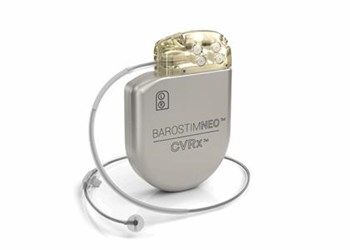J&J Leads $113 Million Investment In Heart Failure Device Maker CVRx
By Jof Enriquez,
Follow me on Twitter @jofenriq

Johnson & Johnson's venture capital arm led multiple investors in Series G round of financing worth $113 million for medical device company CVRx, which will use the funds to complete a pivotal trial for its neuromodulation treatment of heart failure and resistant hypertension.
CVRx picked up equity financing totaling $93 million from existing investors Johnson & Johnson Innovation, New Enterprise Associates, Inc. and Ysios BioFund I F.C.R, and from new investors Gilde Healthcare Partners, Action Potential Venture Capital Limited, and Windham Venture Partners, according to a news release. J&J first invested in Minneapolis-based CVRx in 2008. CVRx also secured a $20 million term loan agreement with Oxford Finance LLC, partly to repay an existing loan.
The Series G capital represents the largest-ever funding round for CVRx, which has now received more than $283 million over nine years in five rounds of financing, reports Twin Cities Business.
"We've been on an upswing since 2011. Before that, it was about the technology development and proving to ourselves, regulators and physicians that it is safe and sustainable. Since then, we produced the second-generation embodiment of our device. It's simple and less invasive," said CVRx CEO Nadim Yared, who also is chairman-elect of Advanced Medical Technology Association (AdvaMed), to the Star Tribune.
CVRx says it will use the fresh capital primarily to complete the Baroreflex Activation Therapy for Heart Failure Pivotal Clinical Trial (BeAT-HF), which is testing the safety and efficacy of the company's Barostim Neo System, a neuromodulator device that activates baroreceptors in the walls of the carotid artery. Electrical impulses from the implant act to modulate efferent pathways and restore sympathetic-vagal balance to lower blood pressure and improve cardiac function.
Barostim Neo is one of the few devices with an Expedited Access Pathway (EAP) designation, which is given to novel or breakthrough medical device technologies that could fulfill unmet medical needs for life-threatening or irreversibly debilitating diseases or conditions (subject to premarket approval applications (PMAs) or de novo requests). The device received CE-marked approval in 2014.
Even though heart failure management in the United States has improved over the past several years, the number of people diagnosed with heart failure is expected to increase from about 5.7 million today to nearly 8 million by 2030, according to the American Heart Association. Nearly 309,000 Americans died from heart failure-related causes in 2014, up from about 290,000 in 2000. The increase is partly attributed to the aging population, which has a greater incidence of heart failure overall.
